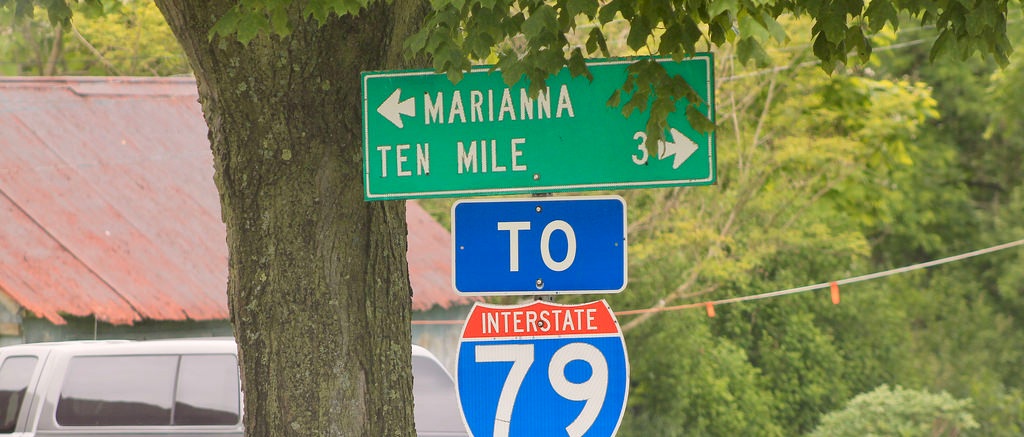
The Borough of Marianna is a small rural community located in the southeastern region of Washington County, Pennsylvania. Washington County has the most fracked wells in the state of Pennsylvania, with 1,146 currently. According to FracTracker, there are presently no wells drilled within the borders of Marianna; however, fracking development surrounds the rural community and will be moving within the borough soon enough.
Sarah Rankin, with The Environmental Health Project, provided a plethora of information for community members. The organization’s purpose is to collect data from individuals living near well sites regarding health impacts and changes due to fracking in their area. To do so, community members who are impacted can answer a health assessment questionnaire, with an opportunity to control “how and with whom [their] information is shared.” The organization uses this data to consult with individuals about ways they can mitigate health impacts based on their symptoms. They also use collected data to produce and spread information to educate people about protecting the health of the communities affected in the region. In addition, they provide their research findings to health care providers and public officials who are making decisions around fracking in the region. Residents living within a 3-mile radius of a fracking operation can request an air or water monitor from EHP to be used in their home free of cost. EHP monitors the air and water quality within the homes of residents and uses the data to mitigate any health impacts of those individuals and/or to present information to the DEP to request mitigation. EHP also suggests that, particularly for individuals with private water supplies (i.e., a well or spring), community members regularly monitor their water for conductivity based on the locality’s standards for water consumed.
The Environmental Health Project also offered information regarding the health of workers in the industry, citing that “People who work in the unconventional oil and gas development (UOGD, commonly called “fracking”) industry have an annual fatality rate of 27.5 per 100,000, which is more than seven times higher than the rate for all US workers.” Workers are regularly exposed to wastewater, silica, diesel, lead and various other chemicals. EHP suggests that workers visit their website to learn more about their rights as employees, and/or discuss their experience with an EHP representative.
Earthworks is a national organization that conducts research across communities affected by fracking development. According to Leannn Leiter, Earthworks uses a FLIR GF320, a camera used across the industry to identify emissions, leaks, and “events that occur during routine oil and gas operations, or because of faulty equipment, accidents, and intentional releases by operators.” Earthworks has invested a lot of resources to building out their FLIR operation, which can be utilized by communities seeking reliable, visual data to support their efforts to protect themselves and others from harmful emissions. The camera displays the release of hydrocarbons, a compound of hydrogen and carbon, such as any of those which are the chief components of petroleum and natural gas, not just heat. This is useful for community members because the organization uses this technology to respond to the concerns of local people. Earthworks encourages residents to pay attention to odors, changes in vegetation and wildlife near their homes, changes in the sounds coming from facilities as well as changes in operation, as these are examples of potential increases in emissions. Much of what Earthworks uncovers is due to faulty equipment and/or increased emissions as a result of something on a site that can be fixed. You can report these concerns to Earthworks at 202-887-1872, extension 130, and you can learn more about the work Earthworks is doing in our region by checking out their publication “Country living, dirty air,” which includes research from Washington County.
Lisa Graves-Marcucci, with the Environmental Integrity Project, explored the prevalence of piecemeal permitting in the oil and gas industry whereby original permits for minor emissions are distributed in a series. These minor emissions permits are then later amended to actually include much greater emissions levels. This denies right-to-know opportunities for the community, public notices, and an actual understanding of the impacts of an entire operation. The organization also presented on issues of zoning in our region: given that much of rural Pennsylvania is not zoned, major industrial sites are popping up legally in agricultural communities.
To close out the meeting, Lois Bjornson described the work of the Clean Air Council and projected a number of photographs of the various impacts of hydrofracking, including the wells and pipelines associated with it.
As a CCJ Community Organizer, it was pleasing to see a turnout of 15-20 people in the space. I look forward to engaging more with rural communities like Marianna, where community members are facing the direct impacts of the oil and gas industry. I am interested in pursuing more meetings that look like the one held at the Marianna Volunteer Fire Department and having the opportunity to engage in conversations with more rural community members.
